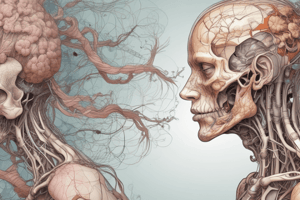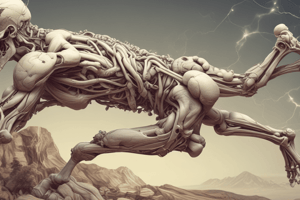Podcast
Questions and Answers
What percentage of total body fluid is contained in the intravascular compartment?
What percentage of total body fluid is contained in the intravascular compartment?
- 20%
- 30%
- 5% (correct)
- 10%
What is the primary function of interstitial fluid?
What is the primary function of interstitial fluid?
- To produce hormones
- To maintain electrolyte balance
- To regulate blood pressure
- To facilitate exchange of nutrients and waste (correct)
Which of the following is a cause of fluid shifts?
Which of the following is a cause of fluid shifts?
- Changes in hormone levels
- Changes in blood pressure (correct)
- Changes in muscle mass
- Changes in body temperature
What is the effect of hypovolemia on the body?
What is the effect of hypovolemia on the body?
What is the role of osmoreceptors in regulating fluid compartments?
What is the role of osmoreceptors in regulating fluid compartments?
What is the primary function of the intracellular compartment?
What is the primary function of the intracellular compartment?
What is the effect of fluid shifts on the body?
What is the effect of fluid shifts on the body?
Which of the following is NOT a type of fluid compartment?
Which of the following is NOT a type of fluid compartment?
Why is regulation of fluid compartments important?
Why is regulation of fluid compartments important?
Flashcards are hidden until you start studying
Study Notes
Fluid Compartments
A fluid compartment is a space within the body that contains a fluid, such as blood, lymph, or interstitial fluid.
Types of Fluid Compartments
- Intravascular compartment: The space within blood vessels that contains blood.
- Accounts for approximately 5% of total body fluid.
- Contains plasma and formed elements (red blood cells, white blood cells, and platelets).
- Interstitial compartment: The space outside blood vessels and within tissues that contains interstitial fluid.
- Accounts for approximately 15% of total body fluid.
- Interstitial fluid surrounds cells and facilitates exchange of nutrients and waste.
- Intracellular compartment: The space within cells that contains intracellular fluid.
- Accounts for approximately 40% of total body fluid.
- Intracellular fluid is the fluid within cells and plays a crucial role in cellular functions.
Fluid Shifts
- Fluid shift: The movement of fluid from one compartment to another.
- Causes of fluid shifts:
- Changes in blood pressure
- Changes in osmotic pressure
- Inflammation
- Infection
- Surgery
- Trauma
- Effects of fluid shifts:
- Edema (swelling)
- Hypovolemia (decreased blood volume)
- Hypervolemia (increased blood volume)
Regulation of Fluid Compartments
- Regulation mechanisms:
- Osmoreceptors
- Baroreceptors
- Hormonal regulation (e.g., antidiuretic hormone, aldosterone)
- Renal regulation (e.g., kidney function)
- Importance of regulation: Maintains fluid balance, blood pressure, and electrolyte balance.
Fluid Compartments
- The body contains three fluid compartments: intravascular, interstitial, and intracellular.
Types of Fluid Compartments
- Intravascular compartment: Contains blood, accounts for 5% of total body fluid, and includes plasma and formed elements (red blood cells, white blood cells, and platelets).
- Interstitial compartment: Contains interstitial fluid, accounts for 15% of total body fluid, and surrounds cells to facilitate exchange of nutrients and waste.
- Intracellular compartment: Contains intracellular fluid, accounts for 40% of total body fluid, and plays a crucial role in cellular functions.
Fluid Shifts
- Fluid shift: The movement of fluid from one compartment to another due to changes in blood pressure, osmotic pressure, inflammation, infection, surgery, or trauma.
- Effects of fluid shifts: Edema (swelling), hypovolemia (decreased blood volume), and hypervolemia (increased blood volume).
Regulation of Fluid Compartments
- Regulation mechanisms: Osmoreceptors, baroreceptors, hormonal regulation (e.g., antidiuretic hormone, aldosterone), and renal regulation (e.g., kidney function).
- Importance of regulation: Maintains fluid balance, blood pressure, and electrolyte balance.
Studying That Suits You
Use AI to generate personalized quizzes and flashcards to suit your learning preferences.





